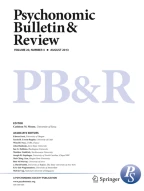Abstract
The cognitive literature now shows how critically math performance depends on working memory, for any form of arithmetic and math that involves processes beyond simple memory retrieval. The psychometric literature is also very clear on the global consequences of mathematics anxiety. People who are highly math anxious avoid math: They avoid elective coursework in math, both in high school and college, they avoid college majors that emphasize math, and they avoid career paths that involve math. We go beyond these psychometric relationships to examine the cognitive consequences of math anxiety. We show how performance on a standardized math achievement test varies as a function of math anxiety, and that math anxiety compromises the functioning of working memory. High math anxiety works much like a dual task setting: Preoccupation with one’s math fears and anxieties functions like a resource-demanding secondary task. We comment on developmental and educational factors related to math and working memory, and on factors that may contribute to the development of math anxiety.
Article PDF
Similar content being viewed by others
Avoid common mistakes on your manuscript.
References
Adams, J. W., &Hitch, G. J. (1997). Working memory and children’s mental addition.Journal of Experimental Child Psychology,67, 21–38.
Ashcraft, M. H., &Kirk, E. P. (2001). The relationships among working memory, math anxiety, and performance.Journal of Experimental Psychology: General,130, 224–237.
Ashcraft, M. H., Krause, J. A., &Hopko, D. R. (2007). Is math anxiety a mathematical learning disability? In D. B. Berch & M. M. M. Mazzocco (Eds.),Why is math so hard for some children? The nature and origins of mathematical learning difficulties and disabilities (pp. 329–348). Baltimore: Brookes.
Ashcraft, M. H., &Ridley, K. S. (2005). Math anxiety and its cognitive consequences: A tutorial review. In J. I. D. Campbell (Ed.),Handbook of mathematical cognition (pp. 315–327). New York: Psychology Press.
Ayres, P. L. (2001). Systematic mathematical errors and cognitive load.Contemporary Educational Psychology,26, 227–248.
Beilock, S. L., Kulp, C. A., Holt, L. E., &Carr, T. H. (2004). More on the fragility of performance: Choking under pressure in mathematical problem solving.Journal of Experimental Psychology: General,133, 584–600.
Campbell, J. I. D. (Ed.) (2005).Handbook of mathematical cognition. New York: Psychology Press.
Campbell, J. I. D., &Charness, N. (1990). Age-related declines in working memory skills: Evidence from a complex calculation task.Developmental Psychology,26, 879–888.
Campbell, J. I. D., &Xue, Q. (2001). Cognitive arithmetic across cultures.Journal of Experimental Psychology: General,130, 299–315.
Faust, M. W., Ashcraft, M. H., &Fleck, D. E. (1996). Mathematics anxiety effects in simple and complex addition.Mathematical Cognition,2, 25–62.
Fürst, A. J., &Hitch, G. J. (2000). Separate roles for executive and phonological components of working memory in mental arithmetic.Memory & Cognition,28, 774–782.
Hamann, M. S., &Ashcraft, M. H. (1986). Textbook presentations of the basic addition facts.Cognition & Instruction,3, 173–192.
Hecht, S. A. (2002). Counting on working memory in simple arithmetic when counting is used for problem solving.Memory & Cognition,30, 447–455.
Hembree, R. (1990). The nature, effects, and relief of mathematics anxiety.Journal for Research in Mathematics Education,21, 33–46.
LeFevre, J.-A., DeStefano, D., Coleman, B., &Shanahan, T. (2005). Mathematical cognition and working memory. In J. I. D. Campbell (Ed.),Handbook of mathematical cognition (pp. 361–378). New York: Psychology Press.
LeFevre, J.-A., Sadesky, G. S., &Bisanz, J. (1996). Selection of procedures in mental addition: Reassessing the problem-size effect in adults.Journal of Experimental Psychology: Learning, Memory, & Cognition,22, 216–230.
Logie, R. H., Gilhooly, K. J., &Wynn, V. (1994). Counting on working memory in arithmetic problem solving.Memory & Cognition,22, 395–410.
Ma, L. (1999).Knowing and teaching elementary mathematics: Teachers’ understanding of fundamental mathematics in China and the United States. Mahwah, NJ: Erlbaum.
Seyler, D. J., Kirk, E. P., &Ashcraft, M. H. (2003). Elementary subtraction.Journal of Experimental Psychology: Learning, Memory, & Cognition,29, 1339–1352.
Siegler, R. S., &Booth, J. L. (2005). Development of numerical estimation. In J. I. D. Campbell (Ed.),Handbook of mathematical cognition (pp. 197–212). New York: Psychology Press.
Siegler, R. S., &Shrager, J. (1984). A model of strategy choice. In C. Sophian (Ed.),Origins of cognitive skills (pp. 229–293). Hillsdale, NJ: Erlbaum.
Tronsky, L. N. (2005). Strategy use, the development of automaticity, and working memory involvement in complex multiplication.Memory & Cognition,33, 927–940.
Turner, J. C., Midgley, C., Meyer, D. K., Gheen, M., Anderman, E. M., Kang, Y., &Patrick, H. (2002). The classroom environment and students’ reports of avoidance strategies in mathematics: A multimethod study.Journal of Educational Psychology,94, 88–106.
Zbrodoff, N. J., &Logan, G. D. (2005). What everyone finds: The problem-size effect. In J. I. D. Campbell (Ed.),Handbook of mathematical cognition (pp. 331–345). New York: Psychology Press.
Author information
Authors and Affiliations
Corresponding author
Rights and permissions
About this article
Cite this article
Ashcraft, M.H., Krause, J.A. Working memory, math performance, and math anxiety. Psychonomic Bulletin & Review 14, 243–248 (2007). https://doi.org/10.3758/BF03194059
Issue Date:
DOI: https://doi.org/10.3758/BF03194059
